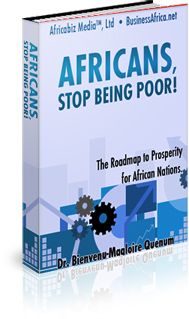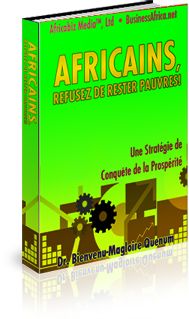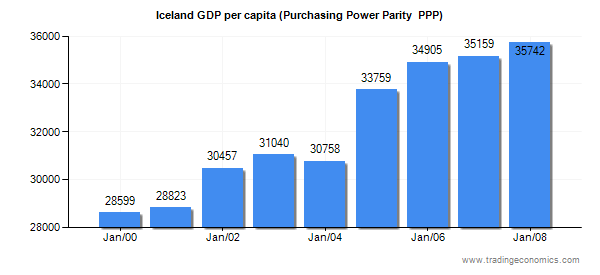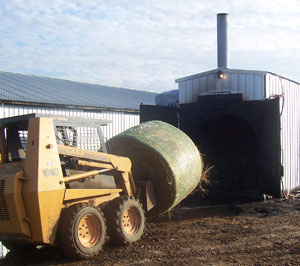|
****JavaScript based drop down DHTML menu generated by NavStudio. (OpenCube Inc. - http://www.opencube.com)****



|
| ! |
| AFRICABIZ
VOL 2 - ISSUE: 116
October 15, 2009 - January 15, 2010
Previous
Issue
Editor: Dr. Bienvenu-Magloire Quenum
Click here for contact & support console
| | A
WORD FROM THE EDITOR
| | |
|
Dear visitor and international investor,
We
warmly welcome you, if this is
your first visit to Africabiz
Online - The ultimate newsletter
on trading and investing in 49
sub-Saharan African countries.
If you are a regular and faithful
reader, welcome back.
-
A CASE STUDY ABOUT AN EUROPEAN COUNTRY DEMISED BY THE CRISIS
The evolving world financial crisis that officially started last term of year 2008, but in reality was brewing since three years at least, shrunk the economy worldwide, forcing countries to recourse to costly and heavy financial stimulus packages that created abyssal budget's deficits.[1, 2, 3]
All this was the result of the reckless risks taken by the management and traders of developed world major banking system, to maximize profits through unbelievable financing schemes.
Indeed, the developed world banking system, mainly in Wall Street and the City of London, UK, engaged for two decades running in "bizarre" banking practices, lending money to people that do not have the resources to pay back, and therefore generating "toxic" assets. You know that already. Jonathan Jarvis's video available here, however, put everything in perspective, and explain more.
In addition to the financial centers of New York City and the City of London, UK, one country stands as the show case highlighting all the aspects and defaults of the new financing credo exposed in Jonathan Jarvis's video, the Republic of Iceland - An island country in the North Atlantic near the Arctic Circle. Reykjavik is the capital and the largest city, accounting for almost half of citizens living in the country. Population: 302,000.
In said country, historically and for centuries, marine resources (fisheries and allied agribusinesses, particularly animal husbandry), and mineral resources (ferrosilicon, and diatomite) exploitation driven the economy and established the country in a prosperity zone for decades running, in the range of High Income Countries (HIC) bracket - US$5,000 to US$9,999.
Then, starting from mid-1980, the government shifted from promoting the traditional economy and rigorous national budget balancing, to boosting financial transactions and services - in line with the financial centers of Wall Street and the City of London, UK.
Consequently, the "tiny" country banking system, backed by a deregulation policy sponsored by the government, indulged in all kinds of financial services matching Wall Street and the City of London traders's sulfurous practices. The country per capita GNP progressively moved from HIC value above outlined, to Very High Income Countries (VHI) bracket, from US$10,000 to US$19,000 and beyond. Icelanders, beginning of year 2008 were listed among the top ranking of the wealthiest people in the world, with a Parity Purchasing Power of US$36,000 as shown on the picture below exposed.
 |
Then suddenly, the international financial system goes berserk, and overnight the "house of cards" collapsed in October 2008, reversing the trend and sending Iceland's economy crashing. Nowadays, Icelanders are no more the wealthiest citizens of the world at large. To say the least.
The actual plight of Iceland is an interesting case study, to compare with African countries's ones, submitted since the mid 1980s to Adjustment Structural Programs (SAP).
Click here
to read about: "The Financial Crisis. A Comparison Between the Plight of Iceland and African Countries.
- VIP
MEMBERSHIP IS LIVE RUNNING
The VIP Members section is now running live. More on the matter is available at following
link that is the permanent announcement page concerning VIP-Membership. Visiting said page, you will always take notice of what is showing live on the confidential newsletter - Inside
Africa & Insights About Africa - dedicated
to VIP Members.
- SERVICES
AND PRODUCTS FROM Dr. QUENUM & ASSOCIATES / BUSINESSAFRICA (TM)
List of Products and Solutions to trading and
investing in and out emerging nations - and particularly in sub-Saharan
African nations - is
here to review.
We draw your attention to the Jobs & Projects'
platform that assists first, project-owners to tender for
the best experts to carry out projects at very competitive costs,
and, second, job-seekers to publish for free Résumés/CV
to attract project-owners attention.
The Free and Pay-Per-Click advertisement
platform is also the cheapest way to advertise for your business
and drive traffic to your website.
-
Contributor's Guidelines
are here to review. Your
contribution on "How
emerging nations and particularly
African countries / entrepreneurs
could bridge the developing gap" is
welcome.
| Your
feedback / objection / contribution is welcome. Visit WorldWide
BizCenter,
and choose General
Information (as topic) to
create a thread for discussion. On the top of the WorldWide BizCenter page,
there is a HELP link to assist you making an efficient
use of the discussion board. This
link also is useful |
Many
thanks for dropping by and see you here on January 15, 2010
Dr.
B.M. Quenum
Editor
of AFRICABIZ

|
| |
| BUSINESS
OPPORTUNITIES IN AFRICA
|
-
Several business opportunities - component parts of the Integrated Developing Scheme described in Africans, Stop Being Poor! are listed in following table.
|
1-SHEA BUTTER (5,
6, 7,
11, 12,
13)
2- BLUE GOLD (14,
15, 16,
17, 18,
19)
3- FREEZE-DRIED PAPAIN (20,
21, 22
and here)
4- KENAF (23,
24)
5- VEGETABLE OIL (25,
26, 27,
28)
6- CEREALS (30,
31, 32,
33)
7- FRUITS (34,
35, 36,
37, 38,
39, 40,
42, 43,
44, 45,
46)
8- ESSENTIAL OILS (47,
48, 49,
50, 51,
52)
|
9- ROOTS & TUBERS (54, 55, 56, 57, 58, 59, 60, 61, 62, 63, 64)
10- FOWL BREEDING (66, 67, 68, 69, 70, 71, 72, 73, 74, 75, 76)
11- FISH FARMING (78, 79, 80, 81, 82, 83, 84, 85, 86, 87)
12- BIOMASS ENERGY (89, 90, 91, 92)
13- SUGAR
CANE & PRODUCTS (93, 94, 95, 96, 97, 98,
99/100, 101, 102)
14- LIVESTOCK (103,
104,
105,
106,
107,
108,
109, 110,
111,
112
15- MISCELLANEOUS (113, 114, 115, 116, 117 |
|
-
MISCELLANEOUS SERIES:RENEWABLE ENERGY: PART IV: STRAW AS RAW MATERIAL TO PRODUCING ELECTRICITY
 In developing countries, and in African nations in particular, straw, hay and leaves - by-products of cereals's and tropical fruits's crops - are not used as raw materials to generate additional revenues. In developing countries, and in African nations in particular, straw, hay and leaves - by-products of cereals's and tropical fruits's crops - are not used as raw materials to generate additional revenues.
For instance, a high proportion (if not the whole available volume) of maize's, corn's, rice's, and sorghum's straw and hay undergoes field burning. That is an astonishing waste of raw material to generating electricity when energy crisis is currently hampering industrial production in most African countries. [1, 2, 3, 4, 5]
The previous delivery of this series, available here, briefly described the potential of hey/straw as raw material to producing energy/electricity and a table exposes sorghum plantations' yield with regards cultivars/species. And the following link exposes the economics about a 200 ha plantation to produce 1000 metric tons of sorghum-grain, and 2360 metric tons of hay/straw/sticks.
The current delivery deals with the production of electricity using above outlined quantity of sorghum straw/hay/sticks as fuel/raw material/feedstock.
An investigation report is available at this link, that provides useful information about (1) soil preparation; (2) cultivars; (3) cultivars; (4) fertilizers (5); and (6) an estimate to establishing a 500 acres/202 hectares of plantation.
 -
BRIEFS ABOUT THE TECHNOLOGY TO USING STRAW AS FEEDSTOCK TO PRODUCING ELECTRICITY -
BRIEFS ABOUT THE TECHNOLOGY TO USING STRAW AS FEEDSTOCK TO PRODUCING ELECTRICITY
 Cereals's straw can either be used alone or mixed with other biomass materials (co-firing or co-combustion) in direct combustion. In this technology, a hay-furnace is used to heat boilers coupled with steam turbines to produce electricity [Picture at the left of this paragraph shows the process of feeding a furnace with a hay-ball - Courtesy of poultry.com]. Cereals's straw can either be used alone or mixed with other biomass materials (co-firing or co-combustion) in direct combustion. In this technology, a hay-furnace is used to heat boilers coupled with steam turbines to produce electricity [Picture at the left of this paragraph shows the process of feeding a furnace with a hay-ball - Courtesy of poultry.com].
In thermal combustion, air is injected into the combustion chamber to ensure that the biomass is completely burned in the combustion chamber. (A picture on the above outlined link shows the inside of a burning hay-furnace.)
At following link are exposed useful information and pictures about equipment and machines.
The study available here provides information about energy content of several biomass feedstock. One sees that sorghum-straw energy content stands at 6.28 MJ per kg. That is, considering the amount (2360 metric tons) of hay/straw/sticks produced by two harvests per year, resulting from the cultivation of 200 ha of sorghum, [6.28 MJ times 2,360,000= 14,820,000 MJ] - Approximately equals to 43 MW-h of generated on-the-spot electricity.
That amount of generated power is another proof that the development strategy exposed here, is a powerful economic catalyst programme capable of boosting an African country's economy on a long term basis. One can imagine the resulting power generating potential that would result from the cultivation of several thousand hectares dedicated to cereals's production - as advocated in the developing strategy described in the above outlined link.
Next delivery, available on January 15, 2010, will consider the production of bio-gas resulting from the exploitation of 200 ha of sorghum plantation.
The delivery here available describes the production of sorghum beer.
Dating back to year 2001, a delivery here briefly exposed deals with the cultivation of Sorghum as an Income Building Power for African rural communities
| MORE
ON STRAW AS RAW MATERIAL |
1-Integrated Renewable Energy
For Rural Communities: Planning Guidelines, Technologies & Applications
By N. El Bassam and P. Maegaard (Hardcover - Jul 14, 2004)
2- Green From the Ground Up
Sustainable, Healthy and Energy-Efficient Home Construction (Builder Guide)
By David Johnston and Scott Gibson (Paperback - April 1, 2008)
3- Electricity in Agriculture & Horticulture
By Selim Lemstr�m (Paperback - Aug 21, 2008)
4-
Fundamentals of Rewable Energy
By Aldo V. da Rosa (Hardcover - Aug 3, 2005)
5-Renewable Energy Resources
By John Twidell (Paperback - Dec 16, 2005)
|
6 - Power Systems Economics
Designing Markets for Electricity
By Steven Stoft (Paperback - May 17, 2002)
7-
A Guide To Rural Energy Independence
By William H. Kemp (Paperback - April 1, 2006)
8-
Energy Demand & Planning
Report Number 31, (Watt Committee Report N� 31) Hardcover - May 5, 1999
9- Renewable Energy In Nontechnical Words
By Ann Chambers (Hardcover - Oct 2003)
10- Fuels of Opportunity
Characteristics and uses In Combustion Systems Third Edition
By David Tillman and N. Stanley Harding (Hardcover - Feb 3, 2004)
|
Adobe
Acrobat Reader is available here
Interested parties - private African and international investors /
companies, government
agencies,
international development
agencies - to make contact through the Free Access Support Console available at this link
Contact through the support console will get quickest reply from Africabiz Online's staff, than contact by emails. Click here for contact information. Be advised that first contact should be through the support console to be followed by phone calls. If you are a VIP-Member, use VIP-Members Support Console available here.
Before you consult please click
here to review this clarification
|
| |
|

